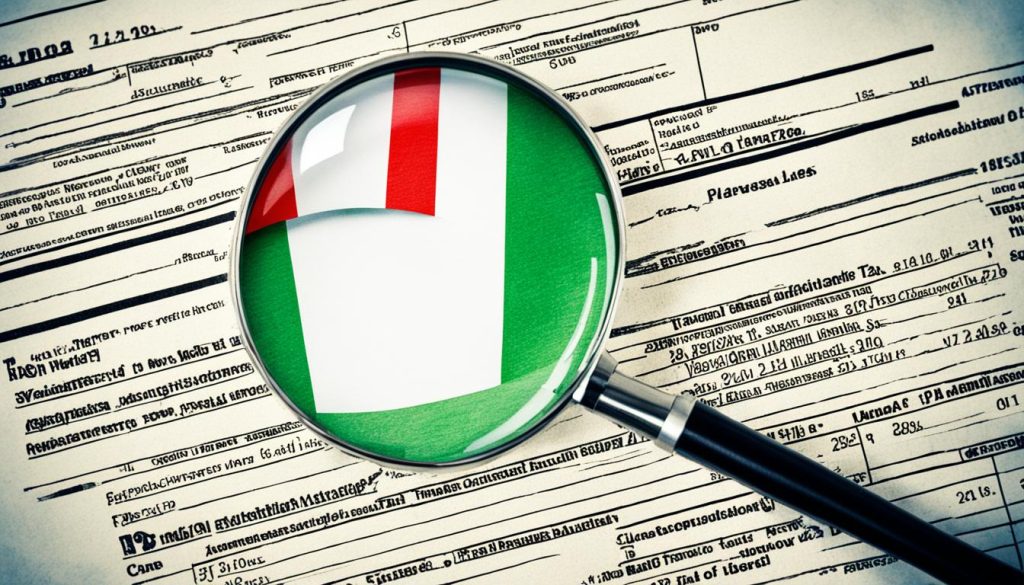If you’re a UK expat thinking about moving to Italy, it’s vital to know the basics of employment there. The job market in Italy can seem complex, especially if you’re coming from a different culture and legal system. You’ll need to understand local employment laws, get the right work permits, and know the cultural differences in the workplace. This guide will help you with the key information to make your job search in Italy successful.
Key Takeaways
- Familiarise yourself with the Italian labour laws and cultural norms.
- Understand various types of work permits required for expatriate employment.
- Recognise the importance of Italian employment contracts.
- Be aware of employee rights and regulations specific to Italy.
- Utilise online job portals and networking to find job opportunities.
- Prepare for potential challenges unique to UK expats in the Italian workplace.
- Stay informed about taxation and social security contributions relevant to your status as an expat.
Understanding the Italian Labour Market
The Italian labour market has its own unique features and challenges. It’s important for UK expats to understand this job market if they’re looking for work. Italy’s unemployment rate is around 9%, but it varies a lot across the country. The south often sees higher rates.
Italy’s economy is driven by tourism, manufacturing, and agriculture. Tourism is a big deal because of Italy’s beautiful culture and landscapes. It draws in millions of visitors every year. Jobs in tourism can be more flexible, but manufacturing jobs might need special skills and qualifications.
There are big differences in the job market across Italy. Places like Lombardy and Emilia-Romagna have lower unemployment and a busier job market than the south. UK expats should think about these differences when looking for jobs. They affect the job availability and the kind of work you can find.
| Region | Unemployment Rate (%) | Key Industry |
|---|---|---|
| Lombardy | 7.5 | Manufacturing |
| Emilia-Romagna | 6.9 | Agriculture |
| Lazio | 8.7 | Tourism |
| Calabria | 16.3 | Agriculture |
| Sicily | 17.0 | Tourism |
The Role of Employment Agencies in Italy
Employment agencies in Italy help expats find jobs by connecting them with employers. They make it easier for people moving to Italy to get work. These agencies help match jobs with the right skills and qualifications.
They have big networks and know about jobs that aren’t advertised. This means expats have a better chance of finding a job. Agencies give insights into what employers in Italy look for.
They also offer advice on making CVs and cover letters fit the Italian job market. This is very helpful for expats who don’t know the local job scene well. With this advice, candidates can stand out to employers.
Employment Basics in Italy: Work Permits and Visa Requirements
For UK expats wanting to work in Italy, it’s key to know about work permits and visa needs. The rules have changed a lot after Brexit. So, it’s vital to understand the different work permits and how to apply for a visa.
Types of Work Permits
There are many work permits for foreign workers in Italy. For UK citizens, the main options are:
- EU Blue Card: For highly skilled workers, offering special benefits for those with top qualifications.
- Intra-Company Transfer Permit: Perfect for workers moving from a UK branch to an Italian one.
- Seasonal Work Permit: For short-term jobs, mainly in farming, tourism, and hotels.
Application Process Overview
Applying for a work permit in Italy can be easy with the right steps. Here are the main steps:
- Collect all needed documents, like job proof, qualifications, and financial info.
- Check the visa needs for UK expats and meet the specific criteria for your permit.
- Send your application to the Italian authorities, watch the deadlines, and follow local rules.
- Keep updated on your application and be ready to give more info if asked.
Every work permit has its own rules and needs. It’s important to pick the right permit for your situation. Knowing this will make applying easier and boost your chances of success.
Employment Contracts in Italy
Employment contracts in Italy are key documents that set out the rules of the work relationship between employers and employees. It’s important for expats to know the different types of contracts and what they cover. This helps them understand their rights and how to work in Italy. This section looks at the main types of employment contracts and what expats need to know.
Types of Employment Contracts
Italy has several types of contracts, each suited for different work situations:
- Fixed-term contracts: These are for a set time and end on a certain date. They’re often for temporary jobs or specific projects.
- Permanant contracts: These don’t have an end date, giving job security. They offer more rights to employees.
- Part-time contracts: These are for fewer hours than full-time jobs. They can be either for a set time or ongoing, offering flexibility.
Each contract type affects employment terms Italy, like benefits, how to end the contract, and what rights you have.
Key Elements of an Employment Contract
Knowing the key elements of contracts is key for a fair work relationship. Important details often include:
- Salary: The pay must be clear, including any extra pay or bonuses.
- Job description: A detailed job overview is important for both sides.
- Working hours: Rules about working hours and overtime should be set.
- Termination conditions: The contract must explain how to end the job, including notice times and reasons for firing.
Knowing these elements is crucial for expats to protect their rights and follow Italian laws. Understanding the difference between fixed-term and permanent contracts helps employees make better choices about their jobs and job security.
| Type of Contract | Duration | Employee Rights | Termination Notice |
|---|---|---|---|
| Fixed-term | Specified duration | Limited rights, often no redundancy | Varies based on contract length |
| Permanant | Indefinite | Full rights, including redundancy | Usually at least 30 days |
| Part-time | Specified or indefinite | Pro-rated rights based on hours | Varies, similar to full-time |
Understanding Employee Rights in Italy
In Italy, strong labour laws protect workers’ well-being and fairness at work. Employees have the right to fair pay, safe conditions, and protection from discrimination. These rights are key to the employee rights in Italy.
Expatriates in Italy have the same rights as locals. It’s vital for foreign workers to know these rights. These rights are backed by laws and regulatory bodies.
Trade unions are key in protecting employee rights in Italy. They speak for workers, negotiating better wages and conditions. This can improve legal protections.
Here’s a closer look at some main employee rights in Italy:
| Employee Rights | Description |
|---|---|
| Fair Pay | Minimum wage standards and timely payment are required to ensure fair compensation for work performed. |
| Safe Working Conditions | Employees have the right to work in environments free from health and safety hazards, with employers responsible for maintaining safety standards. |
| Anti-Discrimination | Protection against discrimination based on gender, age, ethnicity, and other characteristics is fundamental under Italian law. |
| Right to Unionize | All employees can join trade unions and partake in collective bargaining to negotiate better working conditions. |
| Data Privacy | Employees have rights regarding the privacy and protection of their personal data within the workplace. |
Taxation and Payroll Considerations in Italy

For UK expats, knowing about taxes in Italy is key. Italy has different tax rates based on how much you earn. This can change how much you take home. It’s important to know if you’re a tax resident in Italy to understand your tax duties.
Employers in Italy take out income taxes and social security from your pay. This includes things like national insurance, healthcare, and pension contributions. Below is a table showing the main tax rates in Italy:
| Income Range (€) | Tax Rate (%) |
|---|---|
| 0 – 15,000 | 23 |
| 15,001 – 28,000 | 25 |
| 28,001 – 55,000 | 35 |
| 55,001 and above | 43 |
Italy also has tax rules for expats, like filing taxes locally. Some expats might get relief from double taxation under treaties. This means you wouldn’t pay taxes on the same money in the UK and Italy. Knowing these rules can help you avoid fines and make moving to Italy easier.
Working Hours and Overtime Regulations
Knowing about working hours in Italy is key for both locals and expats. The usual work hours follow EU rules, averaging about 40 hours a week. Most people work from Monday to Friday, leaving the weekends for rest. Some jobs might have different hours due to their needs. This info helps workers plan their time and set realistic goals.
Companies must follow strict overtime regulations set by Italian law. Working extra hours means getting paid more. The law says overtime should get at least a 25% pay boost, making sure extra work is fairly rewarded. It’s important for workers to keep an eye on their hours to get the right pay.
It’s vital for all workers in Italy to know their employee rights working hours. They get breaks during the day and at least 11 straight hours off between workdays. Also, they’re entitled to 4 weeks of paid holiday a year. This helps them keep a good work-life balance.
| Aspect | Details |
|---|---|
| Standard Working Hours | Approximately 40 hours per week |
| Days of Work | Monday to Friday |
| Overtime Compensation | Minimum 25% increase on regular rate |
| Minimum Rest Period | 11 consecutive hours per day |
| Annual Leave | 4 weeks paid holiday |
Social Security Contributions for Expat Workers
The social security system in Italy is key for expatriates starting work. Expatriates must pay social security to get access to services and benefits. It’s vital to know about these contributions to fit into Italy’s work world.
Expats in Italy gain a lot from the social security system. They get support in many areas, including:
- Healthcare: Being part of the system means getting Italy’s top public healthcare. It’s key for staying healthy.
- Pensions: Contributions build up for retirement, giving peace of mind for the future.
- Unemployment Benefits: If you lose your job, benefits can help while you look for new work.
It’s important to know how to make social security contributions. You must sign up with the Italian social security body (INPS) and show your ID and job details. This step confirms your right to social security in Italy.
Here’s a table that shows the main benefits of social security for expats:
| Benefit | Description |
|---|---|
| Healthcare | Get access to Italy’s state-funded healthcare services. |
| Pension Eligibility | Build up pension rights for a secure retirement. |
| Income Protection | Get unemployment benefits when you’re looking for a new job. |
| Maternity and Parental Leave | Enjoy paid leave as a new parent. |
Expats should learn about their duties and rights in the social security system. Talking to local experts or government agencies can help clear up any confusion about contributions and benefits.
Finding Job Opportunities in Italy

Looking for jobs in Italy? Online job portals can make your search easier. They offer many platforms tailored for the Italian job market. It’s key to know how to use these sites well.
Utilising Online Job Portals
Online job portals are a great place to start your search. Here are some top sites:
- LinkedIn: A professional networking site with lots of job listings and a chance to meet industry experts.
- Indeed: A global job search engine with a wide range of jobs across various sectors.
- Monster: A leading job portal with specific job listings and career advice.
- Jobrapido: Focused on Italy, it collects job listings from many sources, giving you more options.
Having a strong profile on these sites is crucial. Show off your skills and past work to attract employers. Using keywords related to your dream job makes your profile easier to find.
Here are some tips for searching jobs online:
- Keep your profile up to date with your latest skills and experiences.
- Set up alerts for jobs that match what you’re looking for.
- Connect with professionals in your field to grow your network.
Networking and Building Professional Connections
Building a strong network is key to success in Italy’s job market. Networking can open doors to many opportunities not listed on job sites. Use different strategies and fit into the local culture to make valuable connections.
Joining professional associations in your field is a good move. Membership gives you access to special events and networking chances. Go to industry events to meet people who think like you and learn about market trends. This helps build relationships and shows you’re serious about your work.
Social media is also important for networking today. LinkedIn is the top choice for making professional connections. Keep your profile up to date, share articles, and talk with others. This shows your knowledge and interest in your field. Even small talks can lead to big opportunities.
Here are some tips for expats to improve their networking:
- Join expat groups to connect with others in similar situations.
- Participate in local meetups focused on your profession.
- Seek out mentorship opportunities with seasoned professionals.
- Follow up after meetings with a personal message to strengthen connections.
Building a network takes time and effort, but it can greatly help your career. Embrace the local culture and be proactive. This can lead to strong professional connections in Italy.
| Networking Strategy | Description | Benefits |
|---|---|---|
| Professional Associations | Join industry-specific groups for resources and connections. | Access to events and expert knowledge. |
| Industry Events | Participate in conferences and seminars. | Meet industry leaders and potential collaborators. |
| Utilise LinkedIn for professional networking. | Showcase expertise and connect with peers. | |
| Expat Groups | Engage with fellow expats to share experiences. | Support network and local knowledge. |
Challenges for UK Expats in the Italian Workplace
UK expats in Italy face unique challenges in the workplace. They must understand cultural differences, overcome language barriers, and adapt to local customs. These hurdles can make integration tough.
Communication is a big challenge for expats. Italian workplaces value direct talk and building relationships. Those not fluent in Italian may struggle, leading to misunderstandings with colleagues.
Italy’s way of handling hierarchy and decisions is different from the UK’s. Decisions often take longer, showing a focus on group agreement. UK expats might find this slow pace hard, especially if they’re used to quicker decisions.
To tackle these issues, UK expats can try these strategies:
- Invest in language courses to improve communication.
- Join team-building activities to connect with colleagues.
- Be patient and open-minded about decision-making.
Clear communication and embracing local ways can make the transition smoother. While expats face many challenges, tackling them can lead to a fulfilling experience in Italy.
Cultural Differences in Italian Work Environments

It’s key to grasp the cultural differences in Italy at work for better teamwork. In Italy, people often prefer talking face-to-face. This makes strong bonds among colleagues, which is important in Italian work culture.
Italian businesses value hierarchy but also encourage open talks. This means staff respect their leaders but also share their thoughts freely. It’s a mix of respect and teamwork.
Networking is crucial in Italy. Trust and good relationships can help you move up in your career. Meetings are not just for making decisions. They’re also a chance to build stronger personal connections.
Understanding these points helps you do well in the Italian workplace. Things like how people communicate, the importance of hierarchy, and building relationships affect how work gets done and the results.
Health and Safety Regulations for Employees
In Italy, health and safety laws aim to keep the workplace safe. These rules are key for protecting workers and their rights. Employers must put safety steps in place and follow the laws.
It’s important to report accidents quickly in Italy. Workers must tell their employers about any incidents or dangers they see. Employers need to have clear steps for dealing with these reports and fixing problems to stop them from happening again.
Checking the workplace for safety is crucial. Regular checks by officials help spot risks and make sure safety rules are followed. Workers can see the results of these checks and help talk about making the workplace safer.
Every worker in Italy has the right to a safe job. This means they get the training, safety gear, and help they need to deal with health issues at work. Keeping up these standards keeps workers safe, boosts productivity, and improves morale.
Understanding Termination and Resignation Procedures
Expats in Italy need to know about the termination process Italy to protect their rights. It’s also key to understand resignation procedures. Italian labour laws outline the rules for both employees and employers.
When an employee wants to resign, they must follow certain rules. These rules depend on how long they’ve worked and the type of contract. For instance, they might need to give:
- One month’s notice if they’ve worked for a year or more.
- Two weeks’ notice if they’ve worked for less than a year.
When a job ends, both sides must follow the law. Not having a good reason can make things tricky, especially with employee rights termination. Employers must have a valid reason like:
- Bad behaviour or poor work.
- Company downsizing or financial problems.
If an employee thinks they were unfairly fired, they can go to court. Knowing these details helps expats deal with the Italian work world better.
Resources for UK Expats: Government and Support Services
For UK expats moving to Italy, finding the right expat resources Italy is key. These services help with jobs, daily life, and settling in. The UK Government’s website has consular services that are very helpful when you first arrive.
There are also local support services Italy for expats. Groups like the British Chamber of Commerce in Italy and expat networks hold social events and workshops. They offer advice and help people meet others, making it easier to feel at home.
For legal help or advice on work rights, places like English-speaking legal centres are great. They offer guidance on employment contracts in Italy. Using these resources helps UK expats overcome challenges and enjoy their time in Italy more.
FAQ
What are the key considerations for UK expats looking to work in Italy?
UK expats should learn about Italy’s job market and how it differs from the UK. They need to know about local laws, work permits, and visa needs for a smooth job start.
How does the Italian labour market differ from the UK job market?
The Italian job market has its own features, like different unemployment rates and key sectors like tourism and manufacturing. Job chances vary by region, so UK expats should pick areas with more jobs.
What role do employment agencies play in job hunting in Italy?
Employment agencies help expats find jobs by matching their skills with job openings. They offer services like access to hidden jobs and help with making CVs for the Italian market.
What types of work permits are available to UK nationals in Italy?
UK nationals can get work permits in Italy, like the EU Blue Card, intra-company transfer permits, and seasonal permits. The right permit depends on the job and personal situation.
What are the essential elements of an employment contract in Italy?
An employment contract in Italy must have details like salary, job duties, working hours, and how to end the contract. Knowing these is key for expats to protect their rights at work.
What employee rights do expatriates have in Italy?
Expats in Italy have rights to fair pay, safe work, and protection from bias. Trade unions play a big part in defending these rights and helping workers.
How does the taxation system work for UK expats in Italy?
Italy’s tax system has different rates and mandatory contributions. UK expats need to know their tax duties, residency for tax, and how to file taxes to avoid paying twice.
What are the standard working hours and overtime regulations in Italy?
Italy follows EU rules on working hours, and there are rules on overtime pay. Knowing your rights about work hours is important for a good work-life balance.
How are social security contributions managed for expat workers in Italy?
Expats in Italy must pay social security, which gives access to healthcare, pensions, and jobless benefits. Joining the social security system is key for your well-being.
What strategies should expats use to find job opportunities in Italy?
To find jobs in Italy, use online job sites, network, and make your profile attractive to employers. Using specific keywords can also help improve your search results.
What challenges do UK expats typically face in the Italian workplace?
UK expats often face issues with cultural differences, language, and adapting to local work customs. Learning about these can help with integrating into the workplace.
How do cultural differences impact workplace interactions in Italy?
Culture affects how people communicate, view hierarchy, and value relationships at work in Italy. Knowing this can improve work productivity and teamwork.
What are the health and safety obligations for employees in Italy?
Italy has laws to ensure safe workplaces, including regular checks and employee rights to report hazards. Knowing these laws protects workers’ rights.
What processes must be followed for termination and resignation in Italy?
Ending a job in Italy has legal steps, like giving notice and possibly getting extra pay. Understanding these helps expats handle job changes well.
Where can UK expats find government and support services in Italy?
UK expats can find help in Italy from government services, expat groups, and legal advice centres. These resources are key for a smooth job and life start in the country.









